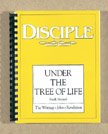 "Instruction" is the second half of the study of the Book of Proverbs. After defining wisdom in the first half of the study, entitled Wisdom, the second part of the book is devoted to rote sayings to be memorized and recalled when a given situation calls for them. What struck me was an interesting set of verses in Proverbs 23:1-8,
"Instruction" is the second half of the study of the Book of Proverbs. After defining wisdom in the first half of the study, entitled Wisdom, the second part of the book is devoted to rote sayings to be memorized and recalled when a given situation calls for them. What struck me was an interesting set of verses in Proverbs 23:1-8,1 When you sit down to eat with a ruler,
observe carefully what is before you,
2 and put a knife to your throat
if you have a big appetite.
3 Do not desire the ruler's delicacies,
for they are deceptive food.
4 Do not wear yourself out to get rich;
be wise enough to desist.
5 When your eyes light upon it, it is gone;
for suddenly it takes wings to itself,
flying like an eagle toward heaven.
6 Do not eat the bread of the stingy;
do not desire their delicacies;
7 for like a hair in the throat, so are they.
"Eat and drink!" they say to you;
but they do not mean it.
8 You will vomit up the little you have eaten,
and you will waste your pleasant words.
While beautifully poetic, this passage is densely incomprehensable. I blame this on poor translation (or my misunderstanding). Verses 1-5 apparently convey that we should not covet the possessions or appetites of the wealthy because of the cost of acquiring and maintaining those material things for which we covet.
Versus 6-8 is less clear. It is easy enough to understand the metaphor for the "bread" of the stingy. The stingy unwillingly give it up while dishonestly conveying his or her faux-generosity. I suspect that, "You will vomit up the little you have eaten, and you will waste your pleasant words." means that spending time with the stingy is a waste of time.
"And I applied my mind to know wisdom and to know madness and folly. I perceived that this also is but a chasing after wind."
© Copyright, C. Michael Bailey, 2006
